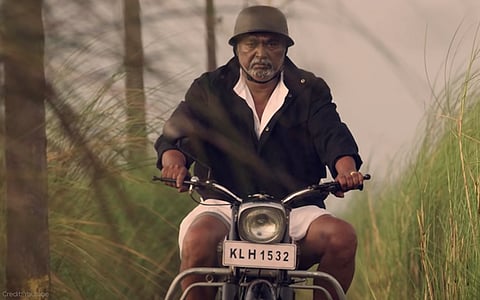
- In-Depth Stories
- Web Stories
- Reviews
- News
- FC Lists
- Interviews
- Features
- FC SpecialsFC Specials

Director: Priyanandan
Cast: Lal
National Award-winning filmmaker Priyanandan's most recent work Silencer, based on a short story by Vaishakan, speaks about three generations of men from the same family. It begins with septuagenarian Eenasu (Lal) walking through a long, empty corridor to enter the brightly lit, consumerist maze of a supermarket. Unable to navigate through its aisles lined with unidentifiable products, Eenasu asks people to help him find what he's looking for…some raw tapioca. He speaks but no one is listening. People walk past him as though Eenasu doesn't exist. He begins to panic as he struggles to find his way out, when a call comes from behind. It's Eenasu's own mirror reflection laughing at a lost man. "You're like an old Raleigh bicycle," says Peter, an old assistant who appears out of nowhere to help his master navigate this strange world. "It might take a long time to get rusted, but it just sits there in one corner without anyone paying attention to it."
Sidelined in his own home without anyone to speak to, Eenasu's daily conversations are almost exclusively with his rusty Rajdoot that he considers his son. Unlike the Eenasu we see in other environments, there's a smile and a peacefulness to him, even in solitude, when it's just him and his steed. But his relationship with his real son Sunny (Irshad), is hardly a love story. Sunny is the town's Shylock, running both a finance company and a bar; both businesses that Eenasu despises. Considering how Sunny's empire was built using money from selling his father's ancestral cycle repair shop, it becomes obvious why the principled Eenasu feels suffocated in the house built by his son.

Describing his family's newfound riches, Eenasu says he can smell brandy in his wife's new jewellery. Even God has let his side, we feel, when his priest matter-of-factly admits to taking Sunny's money. It's a world Eenasu doesn't understand anymore or rather, one that doesn't understand him. Raised by a father who was at once a Gandhian as well as a Communist, Eenasu observes what his generation, and his son's after, has achieved with the freedom the country had gained.
One can connect the way he looks at what we've achieved after Independence with the way he looks at bicycles. "Making a bicycle is engineering, but maintaining is an art-form," he says. Wheels — of a cycle, Eenasu's motorbike and his son's huge SUV — become a metaphor to show us what gets left behind in meaningless pursuits towards progress, especially when they're not "maintained" by ideology.
Narrated using a series of surreal visuals showing us the tug-of-war between the minds of these two men and the reality they're stuck in, Silencer nudges the audience towards taking stock of a family that opts for appearances over intimacy. Conversely, when flesh and blood doesn't amount to anything, can human affection widen to include metal and oil?
Fuelled by Lal's excellent performance (especially in the scene where oil takes the form of blood in the man's hand) Silencer becomes an important window into the voicelessness of our elders. Removing the motorbike's silencer, when you've been asked to keep quiet, then becomes a quiet act of rebellion.